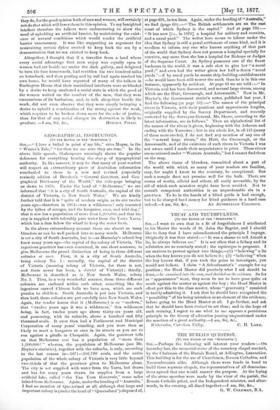TRUST AND TRUTHFULNESS.
[TO THE EDITOR OF THE SF ECTATOR.1
SIR,—I want to own that in a fit of forgetfulness I attributed to his Master the words of St. John the Baptist, and I should like to deny that I have misunderstood the principle I impugn. Originally it was thus stated :—" It was a shame to tell Arnold a lie, he always believes one." It is not often that a fallacy and its refutation are so concisely stated ; the equivoque is pregnant. I am anxious to protest against two things,—(1) "believing" a lie when the boy knows you do not believe it; (2) " believ ing " when the boy knows that, if you took the pains to investigate, you would not believe. I claim "A Schoolmaster's" example for my position ; the Head Master did precisely what I ask should be done,—lie examined into the case, and decided on the evidence. So far as "appearances" went, they seem to me to have gone quite as much against the master as against the boy ; the Head Master in effect put this to the class master, whose "generosity" consisted in tacitly admitting it. I ask that he should have recognised the "possibility" of his being mistaken as an element of the evidence, before going to the Head Master at all. I go further, and ask that be should have been trained to act thus ; and in the hope of such training, I regret to see what to me appears a pernicious principle in the theory of education passing unquestioned under the sanction of a great authority.—I am, Sir, &c.,


































 Previous page
Previous page